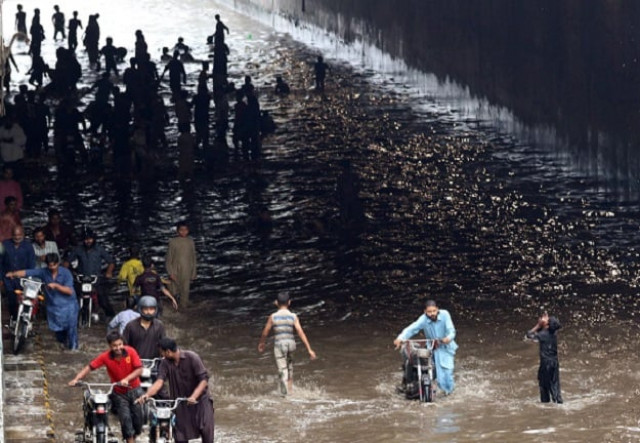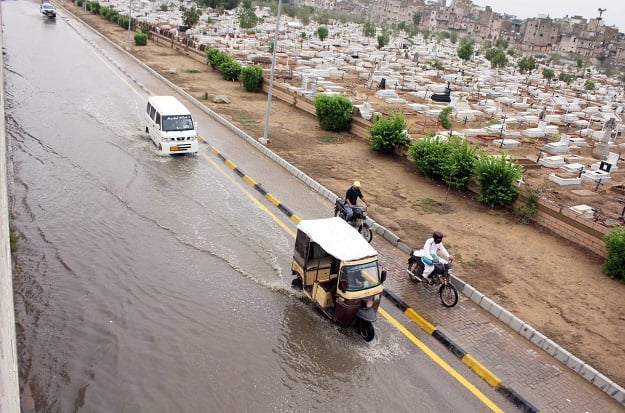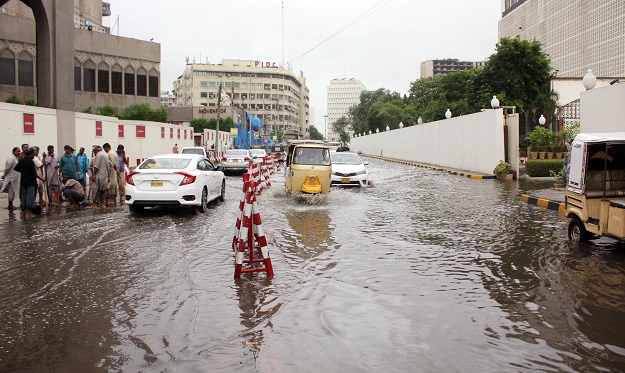Flooding, power cuts pile on misery for Karachi after rain spell
Govt officials engage in blame game as citizens deal with flooded houses, hours-long traffic jams and power outages

Rising water levels caused the Malir River to overflow and the Korangi Causeway and Korangi Crossing areas were flooded in the morning.
Traffic flow was nothing but chaotic and the morning work commute turned into an arduous task for citizens, many of whom spent hours on the Baloch Colony Expressway and other roads leading to Korangi Industrial Area.
The situation in Korangi was preceded by the early Wednesday morning breach at the Lath and Thado dams in Gadap Town, which caused flooding around the Super Highway and its adjacent areas.
10 dead as incessant rain paralyses Karachi
The Pakistan Army was called in for rescue operations in the affected areas which included several residential colonies and the cattle market established along the highway.
 PHOTO: ONLINE
PHOTO: ONLINEIn a tweet, the city's power utility, K-Electric, informed citizens that the Lath Dam's overflowing had led to floodwater entering its KDA Grid station in Scheme 33 of Gulzar-e-Hijri.
Overflow of Lath Dam creates critical situation at KDA Grid. (8)
— KE (@KElectricPk) July 30, 2019
Pakistan Army has come to support our efforts. All possible resources including trenches, water pumps & sand bags around the grid have been deployed to block the water & our teams are on ground to manage situation. pic.twitter.com/27EWjlKv8T
Since the station serves as an "interconnection point between KE and NTDC", power supply was to various parts of Karachi was affected, including Sohrab Goth, Abul Hasan Isphahani Road and Super Highway.
KE warned that it may be "forced to completely shut down power from this grid" which would impact supply to areas including Gulshan, Azizabad, Liaqatabad, Malir, Federal B Area, Surjani Town, Shadman Town and Shah Faisal.
The power utility later announced on Wednesday evening that "the threat of the grid coming under water has been averted" owing to the "efforts of KE teams and the Pakistan Army and Rangers".
Update on KDA Grid: (1)
— KE (@KElectricPk) July 31, 2019
As a result of the untiring efforts of KE teams and the Pakistan Army and Rangers over several hours, the threat of the grid coming under water has been averted.
Rising death toll
The death toll in the current spell of rain also climbed to 15 on Wednesday as two deaths caused by electrocution were reported in Shah Latif Town and Moinabad.
Authorities said the deaths occurred largely due to electrocutions caused by ill-maintained power lines even as large segments of the city suffered hours-long outages that lasted up to a day in some areas.
According to the Edhi Foundation, up to 15 people were killed during the recent bout of flooding. However, government hospitals in the city said only 12 people had died in recent days in flood-related incidents.
Outrage simmered in the city after a video went viral on social media showing two children who had been allegedly electrocuted by a power line that had fallen into a puddle.
"The electricity company must be held responsible for the children's death as safety and security is its responsibility," said Faisal Edhi, who heads the Edhi Foundation.
Dr Seemi Jamali - director of the state-run Jinnah Postgraduate Medical University - confirmed that nine people were "brought dead" to the hospital because of electrocutions.
Another three bodies, including the children from the video shared online, were taken to the city's Abbasi Shaheed Hospital, a doctor on duty at the facility confirmed to AFP.
The megacity of some 20 million has been inundated with heavy rains since Monday, flooding residential areas and bringing large swathes of Karachi's perennially traffic-congested streets to a halt.
"We are living without electricity and water for the past three days and no official rescue came," said 24-year-old resident Qaiser Khan.
Blame game continues
Amid incessant reports of traffic jams, water accumulation and power outages, officials of the provincial and local governments remained preoccupied with shifting blame from themselves.
At a press conference on Wednesday morning, Sindh Local Government Minister Saeed Ghani accused "people sitting in Islamabad" of unfairly blaming the Sindh government for the post-rain situation.
10 killed, 29 injured in five days of torrential rains in K-P
He asserted that the Pakistan Peoples Party's provincial government had done all in its power to avert the crisis. "Our government had already allocated funds to the tune of Rs125 billion for the cleaning of sewers and stormwater drains. That is why most major roads of Karachi were clear for traffic despite the heavy downpour."
 PHOTO: ONLINE
PHOTO: ONLINESpeaking about the rolling power outages, the PPP minister said the provincial government had no mechanism to keep a check on the "incompetence" of K-Electric. "The federal government has the power to do that but the reality is there for all of us to see."
He also criticised the performance of local government representatives and called for their accountability. "Who is responsible for draining out rainwater and cleaning the city's drains? The mayor of Karachi and his subordinates have failed to not fulfill their responsibilities,” said Ghani.
“Will he [Mayor Wasim Akhtar] answer our queries on the promises he made about a cleanliness drive in Karachi? He should tell us if he can’t handle this job - we will do what needs to be done."
The LG minister also issued a call for all political parties to work together instead of engaging in a "blame game".
“Water accumulation is a reality in the most developed of cities. Instead of criticising each other, we should all work together for the people of Karachi."
Sindh Chief Minister Syed Murad Ali Shah asserted that the entire provincial government machinery was active and working tirelessly to serve the people of Karachi.
Speaking to reporters during an inspection visit to different areas, Shah pointed out that all major drains in Karachi were affected by encroachments.
“The width of these drains has been reduced to hardly a few feet. This is a recipe for disaster and that is what we have seen repeatedly," said the CM.
- With additional input from AFP.



















COMMENTS
Comments are moderated and generally will be posted if they are on-topic and not abusive.
For more information, please see our Comments FAQ